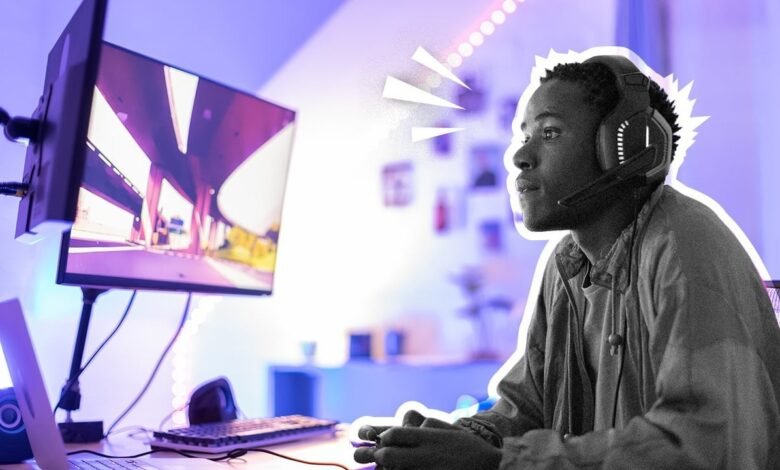Careers in Gaming: Turning Your Passion into a Profession
Careers in Gaming offer exciting opportunities to turn your passion for video games into a rewarding profession in a booming industry.

Careers in gaming are no longer just a dream for video game enthusiasts—they are a thriving reality in today’s fast-evolving industry. From designing immersive worlds to streaming gameplay and creating cutting-edge hardware, the gaming industry offers a diverse range of career opportunities for those passionate about video games. The global gaming market continues to grow, making it a lucrative field for creative, technical, and entrepreneurial minds.
The beauty of careers in gaming lies in their accessibility. With the right skills, dedication, and a willingness to learn, anyone can transition from being a casual gamer to a professional in the field. This article explores the vast array of opportunities available in gaming, the qualifications required, and the steps to turn your passion into a successful career.
Read More: Careers in Gaming: Turning Your Passion into a Profession
Understanding the Gaming Industry’s Growth and Opportunities
Careers in gaming have expanded significantly due to the industry’s rapid growth and technological advancements.
The gaming industry is now worth billions, encompassing video games, esports, virtual reality, and more. This growth has created demand for professionals across various roles, from game development to content creation. Understanding the industry’s dynamics helps aspiring professionals identify the most suitable career paths.
Game Development: The Heart of Careers in Gaming
Game development is one of the most sought-after careers in gaming, involving the creation of video games from concept to execution.
This field requires a blend of creativity and technical skills, with roles like game designer, programmer, and level artist. Game developers collaborate to design engaging gameplay, develop mechanics, and create stunning visuals. A degree in game design or computer science is often helpful for entering this field.
Game Design: Shaping the Player Experience
Game design focuses on creating the mechanics, rules, and systems that make games enjoyable, a cornerstone of careers in gaming.
Game designers conceptualize how a game will work, from its storyline to its challenges. Creativity, problem-solving, and an understanding of player psychology are crucial in this role. Aspiring designers can hone their skills through game design courses and by building prototypes.
Programming and Software Development in Gaming
Programming is a vital component of careers in gaming, involving the technical implementation of game designs.
Game programmers write the code that powers gameplay, graphics, and artificial intelligence. Proficiency in programming languages like C++, Java, and Python is essential. This career path offers opportunities to work on everything from indie games to AAA titles.
Careers in Gaming Art and Animation
Art and animation are integral to creating visually stunning games, making them exciting careers in gaming.
Artists and animators design characters, environments, and special effects, bringing a game’s world to life. Careers in this field require strong artistic skills and knowledge of tools like Maya, Blender, or Photoshop. Building a strong portfolio is essential for aspiring game artists.
Sound Design and Music Composition in Games
Sound design is a vital aspect of careers in gaming, enhancing the immersive experience of video games.
Sound designers and composers create audio effects and musical scores that align with a game’s theme and atmosphere. This role requires creativity, technical expertise, and familiarity with audio editing software. A strong sense of storytelling through sound is key to excelling in this field.
The Rise of Esports and Competitive Gaming Careers
Esports has become a major avenue for careers in gaming, offering opportunities for professional players, coaches, and analysts.
Competitive gaming attracts millions of fans, with tournaments offering significant prize money. Beyond playing, careers in esports include event organization, team management, and broadcasting. Aspiring professionals can start by joining local competitions or building their skills online.
Game Testing: Ensuring Quality and Playability
Game testing is one of the entry-level careers in gaming, focusing on identifying bugs and ensuring a smooth player experience.
Testers play games extensively, looking for glitches, inconsistencies, and areas for improvement. Strong analytical skills and attention to detail are essential for success in this role. Game testing often serves as a gateway to other roles in the gaming industry.
Streaming and Content Creation: Sharing Your Passion
Streaming and content creation are dynamic careers in gaming, allowing individuals to share their gameplay and insights with audiences.
Platforms like Twitch and YouTube enable gamers to monetize their content through ads, sponsorships, and viewer donations. Successful streamers and creators combine entertaining personalities with high-quality production, building loyal fanbases.
Careers in Gaming Journalism and Writing
Gaming journalism and writing are ideal careers in gaming for those who enjoy storytelling and analysis.
Journalists cover gaming news, review titles, and interview industry professionals, while writers create narratives for games. Strong writing skills, an understanding of the gaming landscape, and networking are critical for success in this field.
Game Localization: Bridging Cultural Gaps
Game localization is a growing field in careers in gaming, focusing on adapting games for global audiences.
Localization specialists translate text, adapt cultural references, and ensure the game resonates with players in different regions. Fluency in multiple languages and a deep understanding of gaming culture are essential for this career path.
Virtual Reality (VR) and Augmented Reality (AR) Development
VR and AR are emerging frontiers in careers in gaming, offering innovative ways to create immersive experiences.
Developers in this field work on cutting-edge projects that combine technology and creativity. Skills in programming, 3D modeling, and UX design are critical for success in VR and AR careers.
Marketing and Public Relations in Gaming
Marketing is an essential aspect of careers in gaming, helping companies promote their games and engage with players.
Professionals in this field create advertising campaigns, manage social media, and organize events. Creativity, communication skills, and an understanding of gaming trends are vital for marketing success.
Careers in Gaming Hardware Development
Hardware development offers exciting opportunities in careers in gaming, focusing on creating consoles, accessories, and peripherals.
Engineers and designers work on innovative products that enhance the gaming experience. A background in engineering, product design, or computer science is often required for these roles.
Game Education and Teaching
Teaching and education are rewarding careers in gaming for those passionate about mentoring the next generation of professionals.
Instructors teach game design, programming, and animation at universities, colleges, and specialized academies. A combination of industry experience and strong teaching skills is crucial for success in this field.
Community Management in the Gaming Industry
Community management is an essential component of careers in gaming, fostering relationships between developers and players.
Community managers interact with fans, handle feedback, and create engagement strategies. Strong communication skills and a passion for gaming are necessary for this role.
Entrepreneurship in Gaming: Starting Your Own Studio
Entrepreneurship is an exciting path in careers in gaming, allowing individuals to launch their own studios or projects.
Indie developers create unique games, often starting with small teams and budgets. This career requires creativity, resourcefulness, and business acumen, offering the freedom to bring personal visions to life.
Careers in Gaming Law and Legal Consulting
Gaming law is a specialized field within careers in gaming, focusing on intellectual property, contracts, and regulations.
Lawyers and consultants ensure compliance with industry standards and protect the rights of developers and players. A law degree with expertise in gaming law is required for this career.
Data Science and Analytics in Gaming
Data science is a growing area within careers in gaming, involving the analysis of player behavior and game performance.
Data scientists use insights to improve gameplay, monetize products, and enhance user engagement. Proficiency in statistics, machine learning, and data visualization is essential for this field.
Ethical Considerations in Careers in Gaming
Ethical considerations are increasingly important in careers in gaming, addressing issues like inclusivity, privacy, and fair practices.
Professionals in this area work to ensure that games are accessible, respectful, and free from harmful content. This field requires a strong moral compass and a commitment to social responsibility.
Read More: Careers in Gaming: Turning Your Passion into a Profession
Conclusion
Careers in gaming are as diverse as they are exciting, offering opportunities for creative minds, technical experts, and passionate players. From designing innovative games to streaming gameplay and managing communities, the industry caters to a wide range of interests and skills. As gaming continues to evolve, so do the possibilities for turning a passion for video games into a fulfilling profession.
By exploring the various career paths and building the necessary skills, anyone can carve out a successful future in the gaming industry. Whether through formal education, hands-on experience, or entrepreneurial ventures, the journey from gamer to gaming professional is within reach for those who dare to dream.
FAQs
1. What are some popular careers in gaming?
Popular careers include game design, programming, esports, streaming, and marketing, offering diverse opportunities for enthusiasts.
2. How can I start a career in gaming?
Begin by acquiring relevant skills, building a portfolio, and networking within the industry through events and online platforms.
3. Is a degree necessary for careers in gaming?
While not always required, degrees in game design, computer science, or related fields can enhance opportunities in certain roles.
4. What skills are essential for success in gaming careers?
Skills like creativity, technical expertise, communication, and problem-solving are vital for thriving in the gaming industry.
5. Can I turn gaming into a career without development skills?
Yes, careers in esports, content creation, community management, and marketing allow you to leverage your passion without coding expertise.







